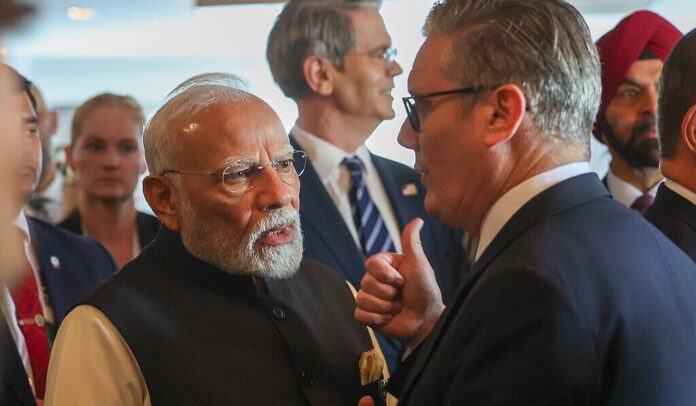A £4.8bn agreement ends years of stalled talks and signals major economic shift for India and UK
Keir Starmer and Narendra Modi will formally sign a landmark £4.8bn trade deal on Thursday, ending three and a half years of stop-start negotiations and marking a significant diplomatic and economic breakthrough for both nations.
The agreement, which will lower barriers to trade on goods such as whisky, cars, clothing and food products, is being hailed by Downing Street as a long-awaited post-Brexit win. For India, it signals the easing of decades of protectionism and its increasing openness to foreign trade and investment.
India’s average tariff rate stands at 13% — markedly higher than the UK’s 1.5%. For British exporters, the deal promises improved access to a fast-growing £3tn economy. For India, the deal is a statement of intent: it is ready to do business on the world stage.
Remarkably, Labour ministers sealed the agreement within 10 months of entering office, defying not only the expectations of sceptics but their own cautious internal timelines. According to several officials, a key driver of success was the strong personal rapport between UK trade secretary Jonathan Reynolds and his Indian counterpart, Piyush Goyal.
British negotiators leaned into the importance of relationship-building, recognising that working with India is less about rigid timetables and more about trust, respect, and personal diplomacy. One memorable gesture came when officials discovered Goyal was a fan of the British sitcom Yes Minister — and surprised him with a handwritten note from co-creator Jonathan Lynn.
Negotiators endured both tense and light-hearted moments. One official recalled a group yoga session in the corridor after fraught talks, while another described a dramatic airport U-turn after a last-minute call from Indian negotiators willing to compromise on food and drink provisions.
Embed from Getty ImagesLabour’s groundwork for the deal began while in opposition. In February 2024, Reynolds and shadow foreign secretary David Lammy travelled to Delhi to rebuild ties frayed during Jeremy Corbyn’s leadership, particularly over Kashmir. Unexpectedly invited to Goyal’s home for late-night chai, the pair pledged to support a deal regardless of which party was in power — a commitment that built goodwill.
Positive signals continued. Lammy’s remarks at the India Global Forum during the UK election campaign reinforced Labour’s seriousness, and Modi’s government took note. Keir Starmer later met Modi on the sidelines of the G20 summit in Brazil to reiterate their mutual ambition.
Still, progress slowed after Labour’s win, frustrating Indian officials. But behind the scenes, ministers were re-evaluating what had been agreed under the Conservatives and planning a coherent path forward.
When Reynolds returned to Delhi in February 2025, negotiations restarted in earnest. Crucially, both sides agreed not to reopen areas already settled under Rishi Sunak’s government — a move that fast-tracked the final phase. By spring, momentum had returned.
In April, Chancellor Rachel Reeves hosted Indian finance minister Nirmala Sitharaman in London. By May, Reynolds and Goyal finalised terms over ice cream in Hyde Park and celebrated with coffee by the lido. The deal was confirmed shortly after by Starmer and Modi in a call.
While the UK remains eager to secure a separate bilateral investment treaty to benefit the City of London, insiders say progress there is less promising unless India makes significant concessions.
Nevertheless, officials are optimistic. One senior UK diplomat reflected: “People said it would never be done. They said India doesn’t sign trade deals. But they’re changing — and so are we.”
